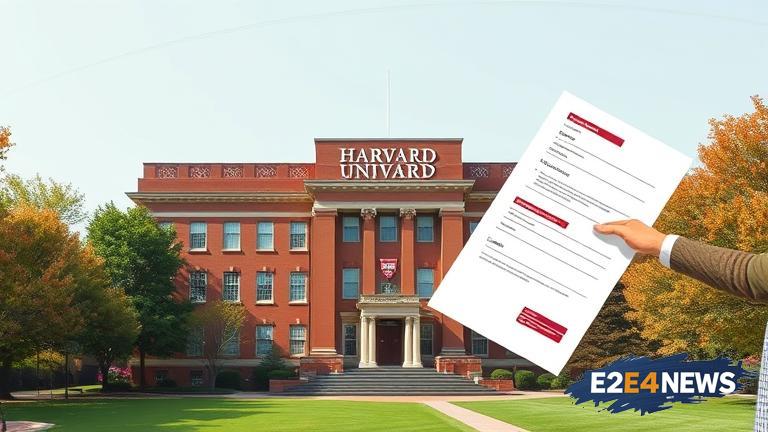In a recent development, Harvard University has complied with a federal request to hand over work authorization forms for its employees. The move has raised concerns among the university community, with many expressing worries over the potential implications for employee privacy and immigration policies. The work authorization forms, also known as I-9 forms, are used to verify the identity and employment eligibility of workers in the United States. The US Department of Homeland Security had requested the forms as part of an investigation into the employment practices of the university. Harvard University has stated that it is cooperating fully with the investigation and has turned over the requested documents. The university has also assured its employees that it is committed to protecting their privacy and will do everything in its power to ensure that their personal information is not compromised. However, many employees are still anxious about the potential consequences of the investigation, particularly those who are not US citizens. The development has also sparked a wider debate about the role of universities in enforcing immigration policies and the potential impact on international students and scholars. Some have argued that universities have a responsibility to comply with federal regulations, while others have expressed concerns that such actions could create a hostile environment for international students and scholars. The investigation is ongoing, and it is unclear what the ultimate outcome will be. In the meantime, Harvard University has advised its employees to seek guidance from the university’s human resources department if they have any concerns about their work authorization or immigration status. The university has also reminded its employees that they have the right to seek legal counsel if they feel that their rights have been violated. The development has also raised questions about the use of I-9 forms and the potential for errors or discrepancies in the verification process. Some have argued that the use of I-9 forms can be problematic, particularly for employees who have complex immigration histories or who are not familiar with the US immigration system. Others have expressed concerns that the verification process can be prone to errors, which can have serious consequences for employees who are found to be ineligible to work in the United States. Despite these concerns, the use of I-9 forms is mandatory for all employers in the United States, and Harvard University is no exception. The university has stated that it takes its responsibility to verify the employment eligibility of its employees seriously and will continue to cooperate with federal authorities to ensure that it is in compliance with all relevant regulations. The investigation has also highlighted the importance of universities having robust policies and procedures in place to ensure that they are complying with federal regulations. This includes having clear guidelines for the verification of employee work authorization and providing support and resources for employees who may be affected by immigration policies. In addition, universities must also be mindful of their obligations under federal law to protect the privacy and confidentiality of employee personal information. The development has also sparked a wider debate about the role of universities in promoting diversity and inclusion, particularly in the context of international students and scholars. Some have argued that universities have a responsibility to create a welcoming and inclusive environment for all students and scholars, regardless of their immigration status. Others have expressed concerns that the current immigration policies and regulations can create barriers for international students and scholars, which can have negative consequences for the university community as a whole. Overall, the development highlights the complex and often challenging issues that universities face in complying with federal regulations while also promoting diversity and inclusion. As the investigation continues, it is likely that there will be ongoing debates and discussions about the role of universities in enforcing immigration policies and the potential impact on international students and scholars.
